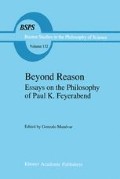Abstract
This is a philosophical paper about experiments in physical science. Their chief role is not to test theories, nor to generate data, nor to make observations possible. An experimenter will want to do all of those things, but even more important is the need to produce stable phenomena. Very few phenomena occur in nature in any readily discernible way, so it is worth saying that the one role of experiment is to “create phenomena”.
Access this chapter
Tax calculation will be finalised at checkout
Purchases are for personal use only
Preview
Unable to display preview. Download preview PDF.
Notes
More exactly, what he writes is that “all these discoveries cry out for a new terminology that no longer separates what is intimately connected in the development of the individual and of science at large”. Chief among these “discoveries” is this: “experience arises together with theoretical assumptions and not before them, and an experience without theory is just as incomprehensible as is (allegedly) a theory without experience”. In the bicentenary year of Kant’s first Critique I find this discovery a trifle jaded. My “new terminology” passes by Feyerabend’s main project of trying to reunite individual and scientific development. This is because I think there is not so much connection between the two.
In R. Colodny, ed., Beyond the Edge of Certainty, New York: Prentice Hall, 1965.
W.V.O. Quine, The Roots of Reference, La Salle: Ill.: Open Court, 1973; pp. 36–39.
Quoted on p. 80 of J. Zed Buchwald, “The Hall Effect and Maxwellian Electrodynamics, Part I: The Discovery of a New Electric Field”, Centaurus 23 (1979), 50–99.
Justus von Liebig, Ueber Francis Bacon von Verulam und die Methode der Naturforschung, Munchen: Lit.-art. Anstatt der J. S. Cotta’schen Buchhandlung, 1863, p.49.
J. E. Littlewood, A Mathematician’s Miscellany, London: Methuen, 1953, p. 43.
Ernst Cassirer, Indeterminism and Modern Physics, New Haven: Yale University press, 1956, p. 4
Sir William Thomson, “Electrical Units of Measurement”, Popular Lectures and Addresses, London: MacMillan, Vol. 1, 1889, p. 73.
Karl Pearson, The History of Statistics in the 17th and 18 Centuries, London: Griffin, 1978, p. 472.
T. S. Kuhn, The Essential Tension, London and Chicago: The University of Chicago Press, 1977.
Author information
Authors and Affiliations
Editor information
Editors and Affiliations
Rights and permissions
Copyright information
© 1991 Kluwer Academic Publishers
About this chapter
Cite this chapter
Hacking, I. (1991). Speculation, Calculation and the Creation of Phenomena. In: Munévar, G. (eds) Beyond Reason. Boston Studies in the Philosophy of Science, vol 132. Springer, Dordrecht. https://doi.org/10.1007/978-94-011-3188-9_5
Download citation
DOI: https://doi.org/10.1007/978-94-011-3188-9_5
Publisher Name: Springer, Dordrecht
Print ISBN: 978-94-010-5406-5
Online ISBN: 978-94-011-3188-9
eBook Packages: Springer Book Archive

